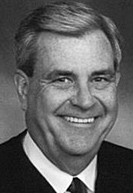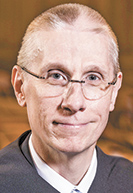Subscriber Benefit
As a subscriber you can listen to articles at work, in the car, or while you work out. Subscribe Now Barnes
Barnes Slaughter
SlaughterSometimes, the robe can be intimidating, as is the pressure that comes with arguing in front of the highest courts in the state. We’ve taken a look behind the bench to get to know who’s really wearing the robe and what it’s like to be an appellate judge.
Indiana Supreme Court Justice Geoffrey G. Slaughter and Indiana Court of Appeals Judge Michael P. Barnes are the featured speakers for the IndyBar Appellate Practice Section’s annual Appellate Roundtable and Reception on October 11, where the two esteemed judicial officers will come together to talk about what you need to know for practicing before appellate courts in Indiana. You can register for the roundtable and reception at indybar.org/events.
Did you ever think you’d serve on an appellate court? Or is it something that, over time, just fell into place?
GGS: Even as a law student, I imagined how much I’d enjoy serving on an appellate court. But I certainly didn’t plan my career on the expectation that would ever happen. As with many things in life, whether it’s finding the right spouse or landing the right job, a lot turns on luck and being in the right place at the right time. Many first-rate lawyers who would make superb judges never have that opportunity. I know how fortunate I am to have the privilege of serving on our state’s highest court.
MPB: As my career progressed, I thought more and more about being a judge. In 2000, the practical, personal and political synergy was there, and I sought, and luckily, was selected as a judge on the Indiana Court of Appeals.
You did not previously serve as a trial judge. What benefit do you think your background gives you as an appellate judge?
GGS: Our five-member court is well-represented with many diverse professional backgrounds. Three of us are former trial judges; there’s a former state and federal prosecutor, a plaintiff’s lawyer, a public defender, and an in-house corporate counsel. I came to the bench directly from private practice and served more than 25 years as a practicing lawyer. Among my colleagues, I have the most recent experience representing private-sector clients—individuals, families, companies. One of the things I bring to the bench as a recent practitioner is the perspective of someone who saw first-hand how clients must live under the rules and procedures that courts impose, and must incur the costs in both time and money of complying with them.
MPB: I’m convinced that, with all due deference to my colleagues who have been trial court judges, that the non-judge perspective is important and brings a view that adds a “layman’s” perspective, which, I think, is healthy and a positive for our court.
What advice do you have for practitioners who are preparing for oral argument?
GGS: Appellate arguments aren’t soliloquys but conversations. The best advocates understand that oral argument is their only opportunity to participate in the judges’ decision conference. Like participants in any conversation, they should not lecture or read to their interlocutors. They should welcome questions and answer them directly and candidly. And above all, they should be well-prepared – meaning they should know the law and the factual record cold.
MPB: My best advice is to prepare, never exaggerate and look at the experience as one that is an opportunity for a conversation with three people to whom you have information to deliver.
Now for a non-legal question: which person, living or dead, do you most admire? Why?
GGS: I have great admiration for my father. Although he’s been gone more than 15 years, I still miss him and think of him often. He was smart, kind, and incorruptible; an avid reader and wonderful writer; and a great teacher who led by example. He had many diverse interests that he pursued passionately. And he loved his family unconditionally. His was a life well lived.
MPB: The true and obvious answer is my parents. My dad: a man who lost his mom in childbirth, spent time in an orphanage, a WWII veteran, ever a tough, but loving Irish man. Mom: obtained a teaching certificate at 17, a two-year college graduate teaching in a one-room country school where many students were older than she. She was refined, intelligent, and a world class pinochle player.•
Please enable JavaScript to view this content.
